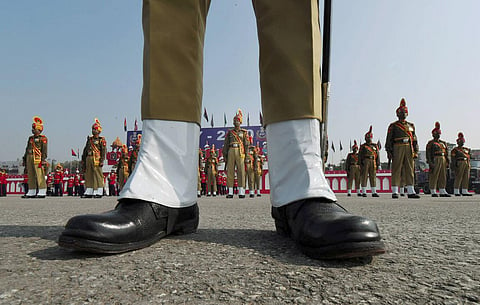

NEW DELHI: The Border Security Force (BSF) personnel who guard the nation’s frontiers, appear to be losing motivation because of the lack of avenues for growth within their service. Take the periodic cadre review. Its stated objective is to make projections of requirements of personnel and to rationalise the cadre structure so as to improve efficiency and morale.
Yet, cadre review of BSF’s Group B and C has not been done since the force came into existence in 1965. Seven years ago, the first proposal for their cadre review was sent to the Ministry of Home Affairs (MHA) for approval. There has been no forward movement yet.
“A cadre review proposal for personnel below officer rank (Group B & C) was ordered on May 15, 2015 by the Director-General of BSF. The proposal was sent to the MHA on Nov 3, 2015,” a senior officer said.
While Group B includes inspectors and sub-inspectors, Group C has constables and head constables. Group A comprises officers — assistant commandant and above. TNIE spoke to multiple personnel of the BSF to understand the situation.
For Group A, the Delhi High Court in 2016 ordered a cadre review, pointing to the younger age profile of commanders in the Army where an officer becomes a commanding officer with around 16 years of service. It directed the Central Armed Police Forces (CAPFs) to likewise bring down the age profiles of their commanders. The average age profile of a BSF commandant, the commanding officer of a unit, is 52 years at present, informed the officer quoted above. The BSF has a strength of around 2,55,000 — around 2.5 lakh below officer rank and around 5,000 officers.
Ranks and promotions are a very important part of the morale and motivation mechanism for every combatised force. Yet, a candidate joining BSF at the bottom of the pyramid can consider himself lucky if he becomes a head constable after 21 long years of service. For, not all constables of the 2000 batch have picked up head constable ranks.
At present, a constable takes more than 32 years to become an assistant sub inspector and 36 years for promotion as sub inspector. Very few reach the inspector rank. “Reaching the rank on an assistant commandant is a rarity,” said sources.
Routine promotions delayed even for BSF officers: Home Ministry
The stagnation is equally bad at the officers’ level where a BSF assistant commandant, who ought to have become a deputy commandant in five years, is taking 12 years to pick his first rank. There is major stagnation at every subsequent rank. The MHA is the cadre controlling authority of the BSF. In its letter on April 20, the MHA acknowledged that not even routine promotions are happening on time.
As per the Department of Personnel and Training, cadre review is to be done every five years. It says, “However, as per the details furnished by the Forces with regards to Departmental Promotion Committees (DPCs) for promotion of various ranks for the vacancy of 2022, it has been observed that a large number of DPCs for promotion in various ranks are pending finalisation.”
The letter asked the CAPF, including the BSF and Assam Rifles, to try and complete the process of DPCs by June 30. But the senior officer was skeptical on whether it will address the widespread stagnation. The problem has become perennial because, “The MHA has no existing mechanism to monitor grievances and career progressions of CAPF officers and resolves them,” the officer said.
BSF low on candidate preference: Study
“An internal analysis of the forms filled by candidates joining the force shows that BSF is among the last in choice, for both officers and personnel,” a senior BSF officer informed